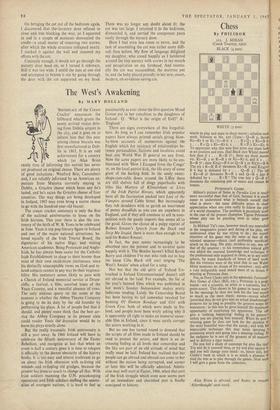The West's Awakening
By MARY
HOLLAND
The cream cracker centenary is only the first of the national anniversaries to loom on the Irish horizon. This year there is also the cen- tenary of the birth of W. B. Yeats to be celebrated in June. Yeats is top pop literary figure in Ireland and one of the major national attractions, be- loved equally of the Irish Tourist Board, the dignitaries of his native Sligo, and visiting American academics. Being Protestant and Anglo- Irish, he has always been easier for the Catholic Irish Establishment to clasp to their bosom than most of their own recalcitrant litterateurs, since his distinctly unacceptable views on God and re- lated subjects cannot in any way be their responsi- bility. His centenary seems likely to pass with a Church of Ireland memorial service at Drum- cliffe, a festival, a film, assorted tours of the Yeats Country, and a merciful absence of rows. The only anxious query on the scene at the moment is whether the Abbey Theatre Company is going to do its duty by the old founder by performing his plays. A lot of people feel that it should, and plenty more think that the best ser- vice the Abbey Company in its present state could render Yeats thd dramatist would be to leave his plays strictly alone.
But the really traumatic Irish anniversary is still a year away. In 1966 Ireland will have to celebrate the fiftieth anniversary of the Easter Rebellion, and recognise at last that when an event is half a century gone it is time to relegate it officially to the decent obscurity of the history books. It is too easy and almost irrelevant to go on about the Irish obsession with re-living old wounds and re-feeling old grudges, because the present has done so much to change all that. With Irish soldiers manning the U.N. peacekeeping operations and Irish scholars staffing the univer- sities of emergent nations, it is hard to feel as
passionately as ever about the first question Maud Gonne put in her catechism to the daughters of Ireland: Q: 'What is the origin of Evil?' A: 'England.'
There are signs everywhere of this forgetful- ness. As long as I can remember Irish popular papers have always printed serials giving blow- by-blow accounts of manoeuvres against the English which for intricacy of relationships be- tween personalities, factions and localities could beat any World War II general on any front. Now the same papers are more likely to be em- blazoned with 'How I Escaped from the Congo' or, on the local patriot kick, the life story of some giant of the hurling field. In the seedy sweet- shops-cum-cafds down around the Liffey there are still shelves full of dingy paperbacks with titles like Martyrs of Kilmainham or Lives of the Irish Patriot Heroes, which apparently have all the fascination packed into Lust of the Vampire around Cable Street. But increasingly they rub shoulders with as garish an assortment of penny dreadfuls as you can see anywhere in England, and if they still continue to sell in com- petition with the gaudy imports that seems all to the good. Given the choice of a pulpy reprint of Robert Emmet's Speech from the Dock and Strip Me Stupid, there is more than enough to be said for Robert Emmet.
In fact, the past seems increasingly to be absorbed into the present and to co-exist quite happily with it. The Beatles haven't killed Kevin Barry and children I've met who mall out to buy the latest Cilia Black still start singing 'The West's Awake' when asked for a song.
Not but that the old spirit of 'Ireland Un- touched is Ireland Uncontaminated' doesn't still stir abroad in the land. For example, the list of the year's banned films which was published in last week's Sunday Independent makes pretty ludicrous reading. Lately the Censorship Board has been having its tail somewhat tweaked for banning Of Human Bondage and Girl with Green Eyes, both of which were made in Ire- land, and people have been wryly asking why it is apparently all right to make an immoral unsee- able film in Ireland, since it must surely corrupt the actors working in it.
But no one has turned round to demand that the scripts of all films made in Ireland should be read to protect the actors, and there is an in- creasing feeling at all levels that censorship and the like are part of an old attitude of mind that really must be laid. Ireland has realised that her people can go abroad and abroad can come to her without the nation being corrupted, and sooner or later this will be officially admitted. Admis- sion may well start at Easter, 1966, when that part of the Irish struggle which even now seems part of an immediate and cherished past is finally consigned to history.






























 Previous page
Previous page